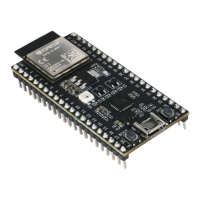Chapter 2. API Reference
Default value:
• Yes (enabled) if CONFIG_ESP32S2_SPIRAM_SUPPORT
CONFIG_SPIRAM_IGNORE_NOTFOUND
Ignore PSRAM when not found
Found in: Component config > ESP32S2-specific > CONFIG_ESP32S2_SPIRAM_SUPPORT > SPI RAM
config > CONFIG_SPIRAM_BOOT_INIT
Normally, if psram initialization is enabled during compile time but not found at runtime, it is seen as an
error making the CPU panic. If this is enabled, booting will complete but no PSRAM will be available.
Default value:
• No (disabled) if CONFIG_SPIRAM_BOOT_INIT && CON-
FIG_SPIRAM_ALLOW_BSS_SEG_EXTERNAL_MEMORY && CON-
FIG_ESP32S2_SPIRAM_SUPPORT
CONFIG_SPIRAM_USE
SPI RAM access method
Found in: Component config > ESP32S2-specific > CONFIG_ESP32S2_SPIRAM_SUPPORT > SPI RAM
config
The SPI RAM can be accessed in multiple methods: by just having it available as an unmanaged mem-
ory region in the CPU’s memory map, by integrating it in the heap as ‘special’memory needing
heap_caps_malloc to allocate, or by fully integrating it making malloc() also able to return SPI RAM
pointers.
Available options:
• Integrate RAM into memory map (SPIRAM_USE_MEMMAP)
• Make RAM allocatable using heap_caps_malloc( …, MALLOC_CAP_SPIRAM) (SPI-
RAM_USE_CAPS_ALLOC)
• Make RAM allocatable using malloc() as well (SPIRAM_USE_MALLOC)
CONFIG_SPIRAM_MEMTEST
Run memory test on SPI RAM initialization
Found in: Component config > ESP32S2-specific > CONFIG_ESP32S2_SPIRAM_SUPPORT > SPI RAM
config
Runs a rudimentary memory test on initialization. Aborts when memory test fails. Disable this for
slightly faster startup.
Default value:
• Yes (enabled) if CONFIG_SPIRAM_BOOT_INIT && CON-
FIG_ESP32S2_SPIRAM_SUPPORT
CONFIG_SPIRAM_MALLOC_ALWAYSINTERNAL
Maximum malloc() size, in bytes, to always put in internal memory
Found in: Component config > ESP32S2-specific > CONFIG_ESP32S2_SPIRAM_SUPPORT > SPI RAM
config
If malloc() is capable of also allocating SPI-connected ram, its allocation strategy will prefer to allocate
chunks less than this size in internal memory, while allocations larger than this will be done from external
RAM. If allocation from the preferred region fails, an attempt is made to allocate from the non-preferred
region instead, so malloc() will not suddenly fail when either internal or external memory is full.
Range:
Espressif Systems 1101
Submit Document Feedback
Release v4.4

